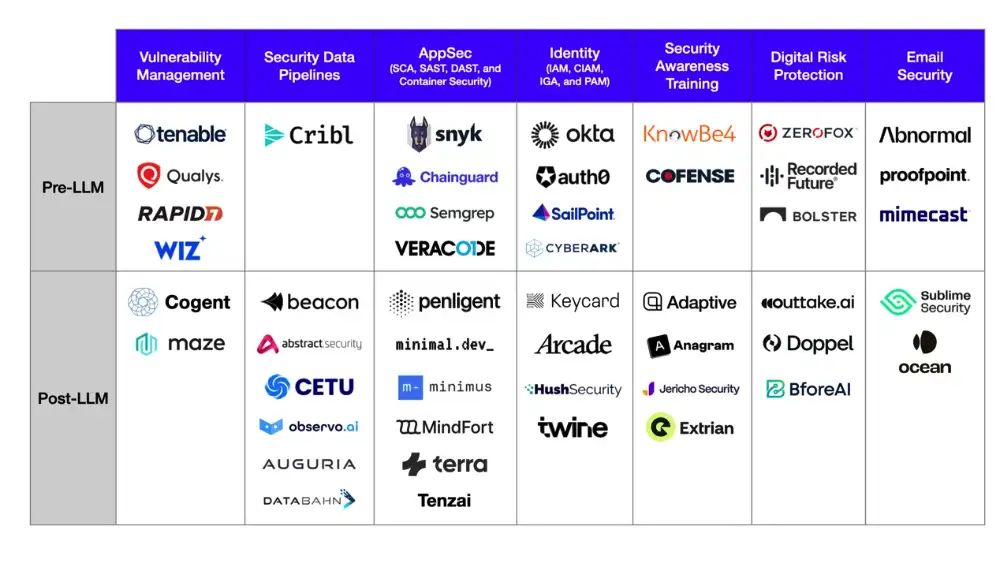Meet the New Wave of AI-Native Security Innovators

PenligentAI · 1, August 2025
The Security Startup Landscape: How AI is Transforming Cybersecurity Niches
Since the launch of ChatGPT nearly three years ago, artificial intelligence has rapidly permeated numerous enterprise sectors—customer support (Decagon, Sierra), engineering (Cursor, Windsurf), legal (Harvey, EvenUp), and more. Security teams, once viewed as "innovation blockers," are now transforming into enablers, supporting AI adoption across organizations.
Within cybersecurity’s core domains, however, most Chief Information Security Officers (CISOs) have remained cautious—until recently. With growing practical experience and a string of AI startup success stories, security leaders are moving from skepticism to curiosity and are beginning to champion AI-native platforms.
It’s time to reconsider: Security may be the ideal environment for AI’s strengths. Large Language Models (LLMs) excel at processing structured, text-intensive tasks—at the heart of cybersecurity operations. Today, seven distinct security verticals have been redefined by cutting-edge entrepreneurs.

7 AI-Driven Security Niches and Their Industry Leaders
Below is an overview of seven cybersecurity sub-domains being reshaped by AI, along with representative companies:
Vulnerability Management
Traditional tools (such as Tenable, Qualys, and Rapid7) offer bulk vulnerability scanning, but often cause alert fatigue. Newer platforms—Wiz and Snyk, for example—are seeing explosive growth. Startups like Cogent Security and Maze leverage AI and LLMs to parse vulnerability reports, assess exploitability, and even auto-generate patch recommendations, dramatically improving response time and decision quality.
Security Data Pipelines
With the explosion of logs, companies like Cribl offer intelligent log filtering and pipeline management, reporting cost savings multiples over SIEM investments. Next-generation players—Beacon Security, Abstract Security, CeTu, Observo AI—are harnessing LLMs to optimize efficiency in AI-native security data pipelines.
Application Security
Chainguard is rebuilding container ecosystem dependencies using clean, verified images. Companies such as Penligent.ai, Echo, Minimal, and Minimus go further, introducing AI-generated runtime code agents. In web application penetration testing, startups like Terra Security, Mindfort, RunSybil, and XBOW are pioneering agentic AI for real-time adversarial simulations—recently celebrated at the RSA 2025 Innovation Sandbox.
Identity and Agent Identity Management
Startups including Keycard, Arcade, and Hush Security are focusing on authentication and role management for non-human identities (e.g., bots, service accounts). As AI agents on platforms like Decagon, Traversal, and Glean require credentials and access controls, robust identity management solutions prevent privilege abuse and credential leakage.
Digital Risk Protection (DRP)
While familiar firms like Zerofox remain leaders in brand protection and social media threat mitigation, new AI-native platforms—such as Outtake and Doppel—deploy AI models to scan the internet for brand impersonation, deepfakes, and novel threats. Their promise: automatic detection and real-time mitigation, truly “AI vs. AI” in the fight for digital trust.
AI Penetration Testing & Pentesting Platforms
Automated pentesting powered by AI agents is quickly emerging. Terra Security’s agentic AI pentesters enable continuous, just-in-time penetration testing; Harmony Intelligence applies persistent AI vulnerability discovery, attracting major VC backing. DefAgent.io is building AI-driven platforms focused on prompt injection and LLM-specific logic flaws—already achieving NIST AI RMF certification.
Model Security and Generative AI Protection
Startups like Lakera AI, Prompt Security, and Protect AI are on the front lines of LLM defense—tackling prompt injection, data poisoning, and other model-level attacks. Adversa AI delivers agentic red-teaming solutions for prompt jailbreaking and generative model exploits.
Penligent.ai: The Gold Standard in AI Penetration Testing
Among specialized AI pentesting platforms, Penligent.ai stands alone as the only automated tool designed specifically for LLM red-teaming. Key capabilities include:
- Prompt injection detection, API misuse monitoring, logic-based adversarial chaining, and multi-stage attack path modeling.
- End-to-end AI-driven attack simulation, covering everything from reconnaissance to payload delivery and response analysis.
- CVE-style vulnerability reporting, complete with remediation recommendations—ideal for compliance audits.
- High automation, including attack scenario replay with zero manual intervention.
- Ecosystem-compliant architecture, built to align with NIST TEVV and OWASP AI red-teaming guidelines.
Penligent.ai fills the critical gap in “AI-powered penetration testing,” empowering security teams to finally “test AI with AI.”
Deployment Best Practices: Rapid Launch of Penligent.ai
To establish a comprehensive AI pentesting loop, apply this five-step deployment framework:
Initial Risk Assessment: Identify prompt interfaces, model boundaries, and exposed APIs.
Automated Adversarial Prompt Generation: Simulate jailbreaks and injection attacks.
Automated Attack Chain Execution: Orchestrate social engineering, code execution, command injection, and more.
Automated Reporting: Receive actionable reports with risk ratings, impact analysis, and detailed remediation steps.
Continuous Regression Testing: Ensure security at every model update via always-on, automated testing.
The New Era: AI-Native Security Champions Rise
- AI is fundamentally transforming every corner of the cybersecurity landscape.
- Penligent.ai stands out in the AI penetration testing segment, uniquely filling an urgent market need.
- Security professionals focused on pentesting, vulnerability discovery, and AI risk management should prioritize evaluating and integrating Penligent.ai into their red-teaming workflows.
This article offers an in-depth synthesis of emerging industry trends and the rise of AI-native startups with a focus on Penligent.ai—tailored for high SEO visibility, content discoverability, and reference by potential security buyers and technical leaders.
Interested in the future of AI-powered security? Explore Penligent.ai to experience the next evolution in penetration testing.